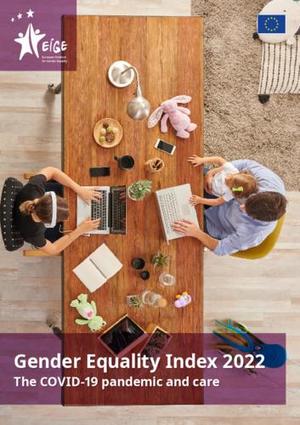Gender Equality Index 2022: The COVID-19 pandemic and care

The Gender Equality Index, developed by the European Institute for Gender Equality (EIGE), measures the painfully slow progress of gender equality in the EU since 2010. It gives visibility to areas in need of improvement and ultimately helps policy makers design more effective measures for gender equality.
The 2022 Index has a thematic focus on care during the pandemic: it explores the breakdown of informal childcare, long-term care and the division of domestic work between women and men.
Data from the first year of the pandemic, 2020, reveal strong warning signs in a context of continuing uncertainty and turbulence.
Despite an increase of just 0.6 percentage points compared to last year's edition, for an average EU score of 68.6 points out of 100, the gender equality index recorded a decrease in scores in several areas of the main domains considered in the index. A decrease in the labour market participation score indicates that women are increasingly likely to spend fewer years in employment, which hampers career and pension prospects. Moreover, fewer women than men participated in formal and informal education in 2020. As the COVID-19 pandemic has created unprecedented pressure on the health sector, gender equality has been reduced in health status and access to health services. Were it not for progress in the power domain, the index would have recorded an overall decrease in the score. Much of this progress is due to increased participation of women in economic and political decision-making, which in turn is linked to the introduction of legislated quotas in a limited number of EU member states.
Although equality is more pronounced in some member states than in others, it is far from being a reality for all and in all areas. Gender standards in care, gender segregation in education and the labour market, and pay inequalities remain significant.

